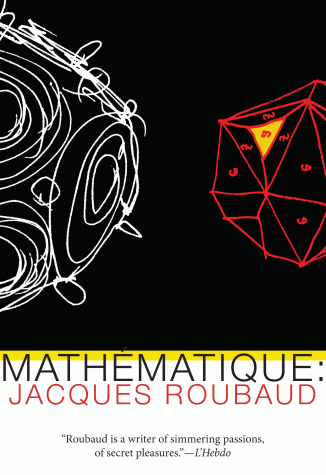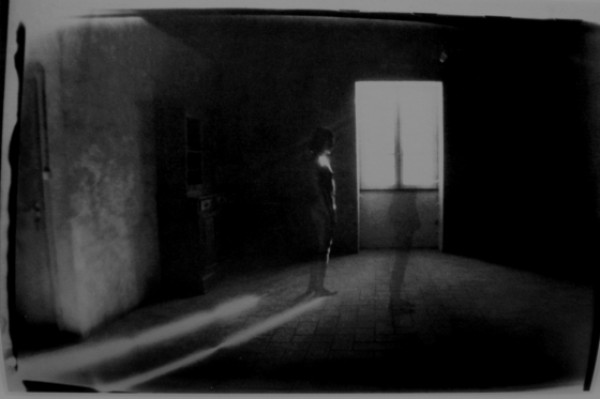Bourbakists for memory, unite! Jacques Roubaud’s MATHEMATICS: (a novel)

Mathematics: (a novel)
by Jacques Roubaud
Dalkey Archive, 2012
312 Pages, $14.95
Buy from Dalkey Archive or Amazon
Jacques Roubaud, a premiere intellectual force throughout the history, to some extent, of French letters, as they say, is primarily known to American readers as a member of the OuLiPo and a poet. Roubaud’s reach, however, spans far beyond these simple categorical realms, throughout his massive ouevre of work, much of which has actually be translated into English.
Mathematics:, while recalling ideas, perhaps, that come up in specific OuLiPian exercises, is not inherently an OuLiPian work, nor is it a work of poetry. The cover of the book, in Dalkey’s translation, presents the work as “a novel,” and to an extent, within the heterodoxical forms that a novel can take, it is indeed a novel, but in the bookstore-culture of American publishing, it would find a place more comfortable within that loose genre of the memoir, the autobiography, the academic term of ‘creative non-fiction.’
The book at hand is the third “branch,” as Roubaud himself calls them, of a larger project dealing with the issue of memory and also, really, Roubaud’s life. And Roubaud has had a full intellectual life, in his work and his academic career, his interactions with the French literati, his presence in the OuLiPo, his poetry and, as it turns out, his career in mathematics.
Copy on the back cover of the book presents the idea that Roubaud is one of the few writers who has successfully bridged the gap between left brain and right brain thinking, hyperbole to an extent because I would insist that there is not such a clear divide in the generation of texts, but there’s a literal application in Roubaud’s mathematics career, and how it’s affected his interactions with the OuLiPo. But, regardless, despite exploring the branch of his own life that is in tangent with his career in mathematics, this insistence is no more than a structural system for Roubaud to explore memory within this specific realm of his own personal history.
There’s nothing too exciting about the literal events that occur within this branch of Roubaud’s life if you’re not connected to a historical exploration of the development of mathematics, specifically in France, from the early 1950s to the mid-1960s. It is interesting to read about, but there’s nothing specific to launch onto–so really, the question is, what’s the draw to read 300 pages of Roubaud’s life as it connects with mathematics?
The answer is simple, and beyond any sort of right brain articulation–Roubaud writes with a pleasantry that moves swiftly, a story-teller of diversions, splitting his own history into the rhizome of existence, a refusal of a straight narrative, an abundance of (as Roubaud himself points out) non-essential details, simply the creation of a narrative space.
There is no explicitly beautiful language present, as it seems that Roubaud saves that for his more highly emotional works (the incredible beauty that’s present in some thing black, Roubaud’s book of poetry written after the death of his wife Alix Cleo Roubaud, is nowhere to be found here). Instead we move through the maze of memory, constructed within a labyrinthine Proustian totality. Roubaud addresses the reader throughout the work, explaining the project, offering his insistence on the work both as exercise and project, aiming towards, perhaps, an unspoken totality, but this is not the totality that Mallarmé was after with his notes toward le livre, rather this is just a re-articulation of a full life in the form of the book.
Roubaud himself being an interestingly detached character, the scenes that occur are both instantly understandable and curiously casual–in fact, Roubaud’s decision to arbitrarily move from poetry and language into mathematics is an understandable one: there’s this thought, perhaps, a thought that I share at least, that in some way mathematics offers an answer to all the questions we as writers have; mathematics offers a totality to these great ideas of life. None of us could say how, and even if we were to attain the level of higher mathematics required to understand the really heavy and earth-shattering proofs that have arose within mathematics throughout its continued development, the lever of pure abstraction wouldn’t offer any solace. But it’s a quantifiable goal, an idea that while maybe we won’t understand the answer, we’ll at least have it.
And through this there is hardly nothing present outside of Roubaud’s interactions with mathematics–there are tangents that arise, tangents of humanity, but only when they’re linked to the mathematical narrative, through people and places met and involved through classes, other professors, drinking soda in the army, reading treatises on algebra in the desert during the war, watching a woman always wait for the train at the same time; all of these things don’t add up to a point, they simple contribute to a life, life as a whole, as something imperfect and incomplete, as something that can be interesting exclusively in the way it’s told to someone else.
November 1st, 2012 / 8:55 pm
if some thing black: On Alix & Jacques Roubaud
Last week I read Dalkey Archive’s somewhat recent release, Alix’s Journal. It was written by Alix Cleo Roubaud, husband of the far-more-visible Jacques Roubaud. Immediately upon finishing Alix’s Journal, I read Jacques’s some thing black. Jacques was a poet, a mathematician, an eventual novelist, and a key player in the OuLiPo. Alix was never sure exactly what she was, other than Jacques wife–which she insisted on her role as with intensity. After Alix died, suddenly, in 1983 of a pulmonary embolism, Jacques began working on some thing black, which took its name from Alix’s series of photographic prints, if some thing black.
Both books, independently and intertextually, are fantastic works. But what becomes most interesting for me, perhaps, is the way in which the book interact. There seems to be a similar relationship between the books (the texts, the written words) as that between Jacques and Alix during their marriage. Alix’s Journal reveals a woman in a primarily male-dominated intellectual world. This is not academia, this is a realm of existence that I doubt still exists in the same way (though to be fair I live in a small town in Northern Illinois)– people, individuals, that care deeply about their own art and the art of others, with no specific ties to a University funding anybody’s motivations. A similar world is exposed in the first volume of Susan Sontag’s journals, and to be fair I can’t help but find it somewhat Utopian.
But this world is not at interest for the time being, because the world of the text that each book carries is one of sadness and desperation.
November 9th, 2010 / 2:38 pm
What I Read While I Was In Europe
With two 10+ hour days of flying, plus several train days sitting between parts of Paris and Italy (including one where Ken and I went on a loop between the two, continually fucking up our connections), I had a lot of time during the 12 days of traveling in Europe with which to spend with my head stuck in a book. As a result, I plowed through 4 books and the beginning of a fifth, all works in translation, including titles by Jacques Roubaud, Alain Robbe-Grillet, Eric Chevillard, Zoran Živković, and Werner Herzog.
Here are some brief thoughts on each:
The Great Fire of London by Jacques Roubaud (Dalkey Archive)
Kicked off the trip with this fat badboy from Dalkey, which carried me up to Washington DC and then through several days in Paris. It’s one of the more original premises and executions of a book I’ve seen in a while, and no surprise in that it is from a major Oulipian. Basically, the book is a book about the book itself more than a book of normal concerns. Not quite a writer writing about writing (thank god), but more a writer spooled in the blank space between such, and crushed in his weird onslaught of memory, a dream conceit of trying to compose a novel that never exists, and the crippling brainspace of having lost a wife. Not quite nonfiction, not quite not, a text about text that manages to do a lot of beautiful examinations of life, such as making jelly, and the descriptions of shapes of rooms and light, among which I was surprised at how compelling he was able to keep the compulsion alive across such a massive tome that essentially is all talk of what it is over being what it is, but then extending through that to actually become the blank. Terrifying in the most on-its-face banal of ways, and electric for its method. Felt right to read this one in Paris, which I had not even realized the connection of which (nor, I swear, did I mean to bring all French authors to France, it just happened).
Bye America

Taking a random, spur of the moment trip with Ken B. to Paris, Turin, and wherever else things decide to tell us to get. Hopefully will still be chiming in on some of y’alls during that time, from Saturday to 8-10 days or so abroad.
Since I have the night to decide what books I’m going to bring with me on the two 14 hour flights, maybe I could use some help. I have a lot of books to choose from. If you feel like it, take a peek at the books I haven’t read, and make suggestions from the archives of which ones should come along in my bag?
Right now the arm of my sofa is placeholding The Great Fire of London by Jacques Roubaud, The Voyeur by Alain Robbe-Grillet, and Hidden Camera by Zoran Zivkovic. Not married to those selections, so any ‘Dude, read this, man’-ing would be most rad.
As well would any recommendations of must-see places in Paris, Turin, or the local outlying regions thereabout.
Bye!

